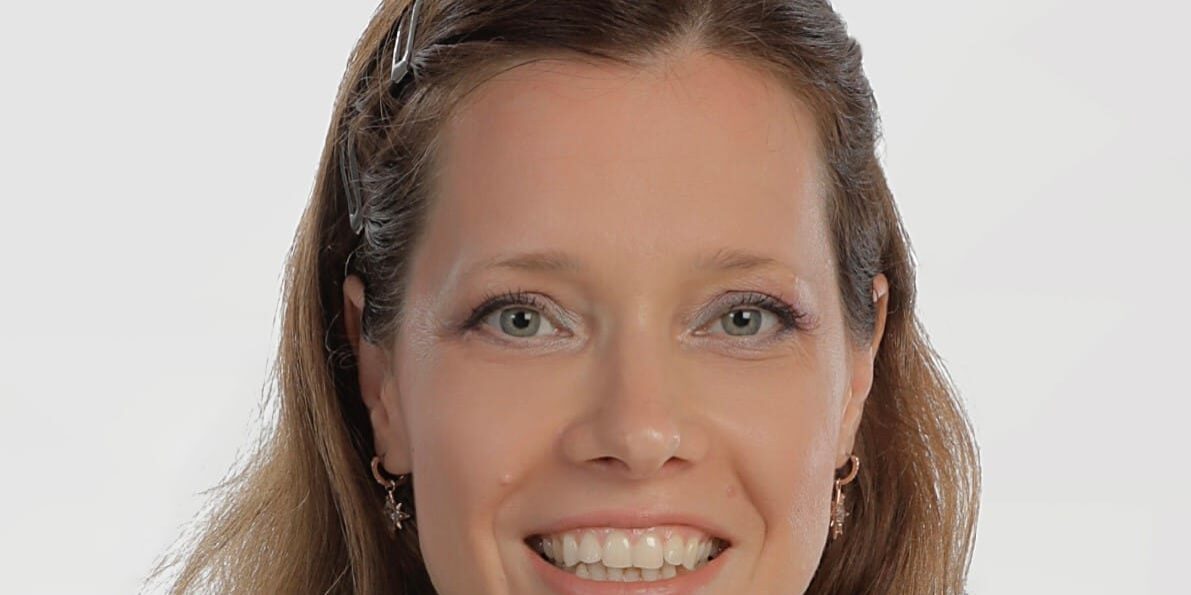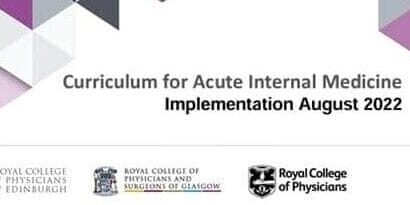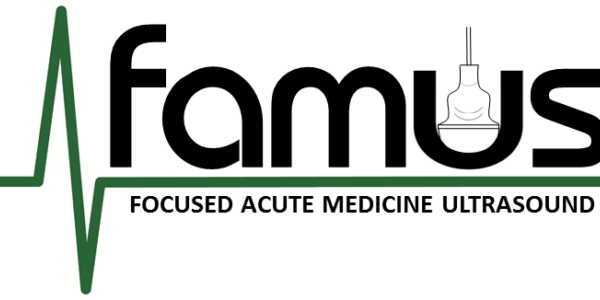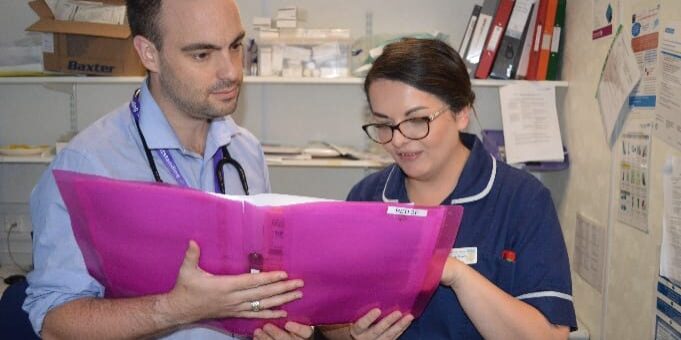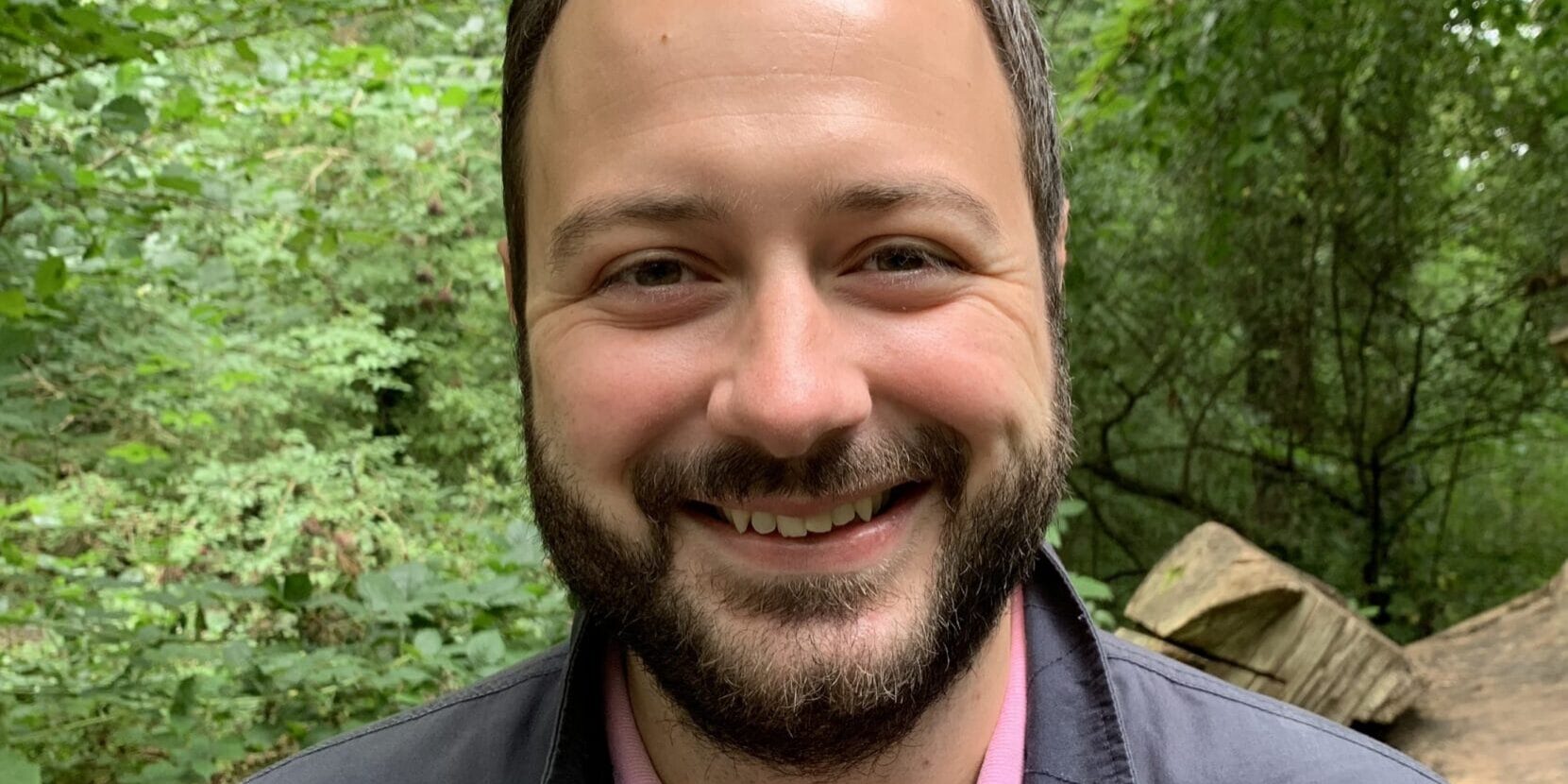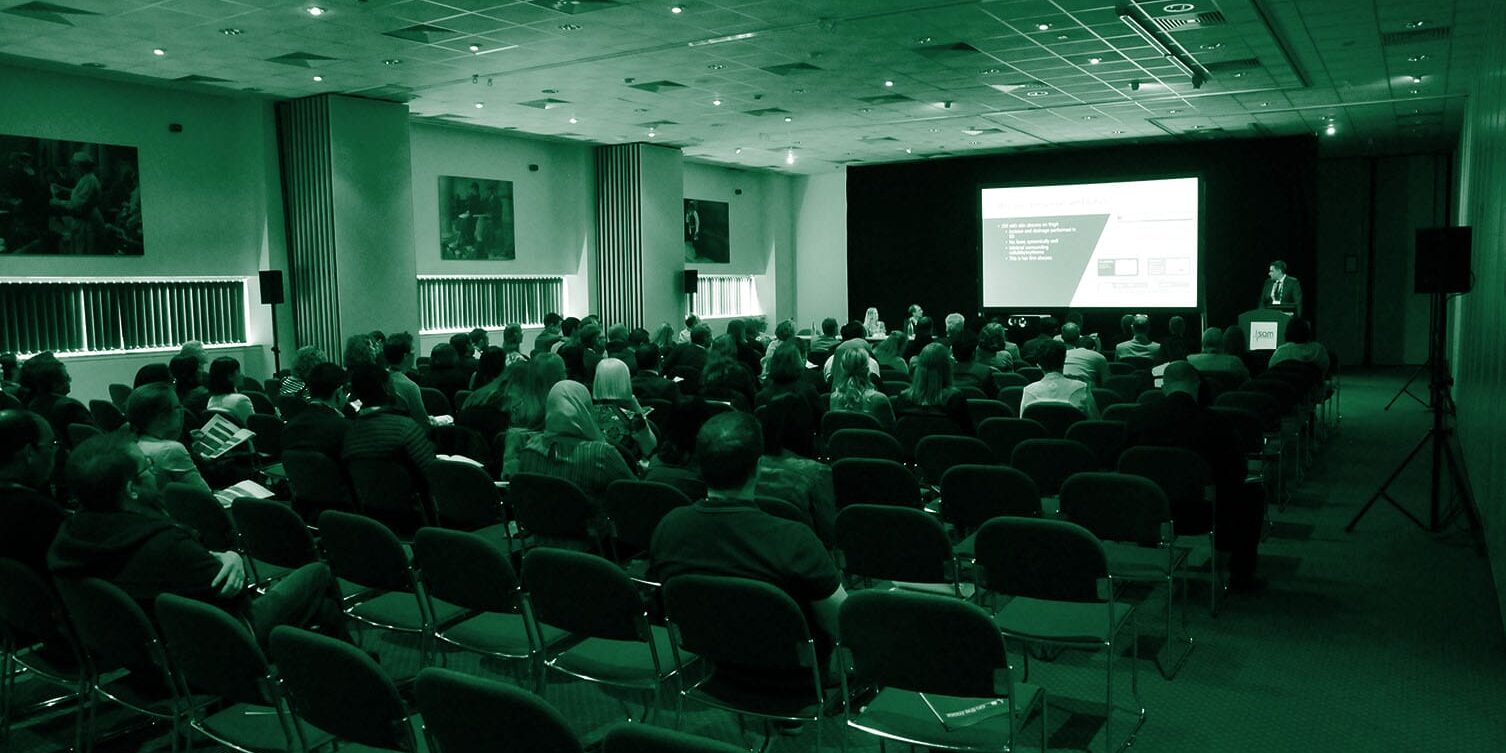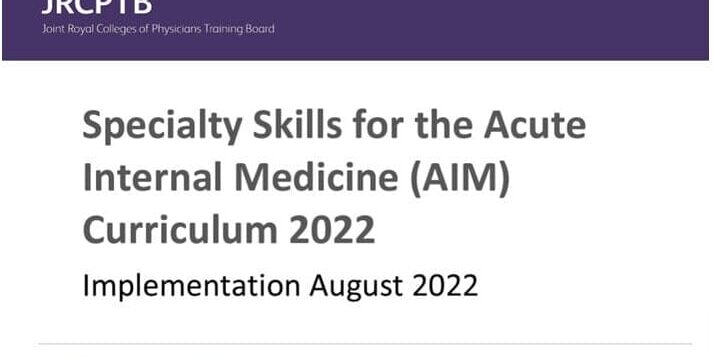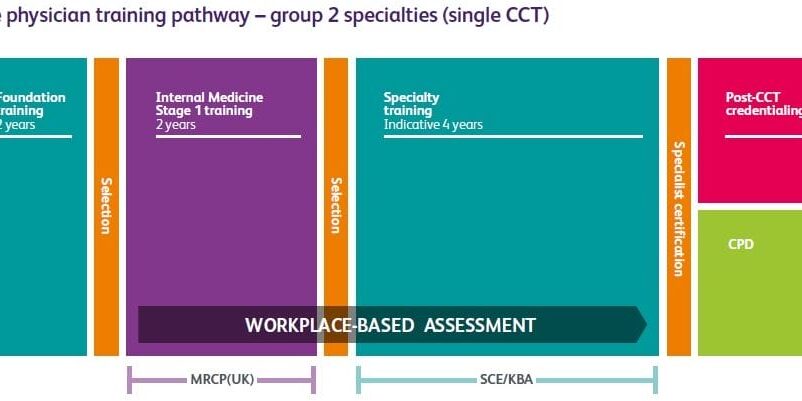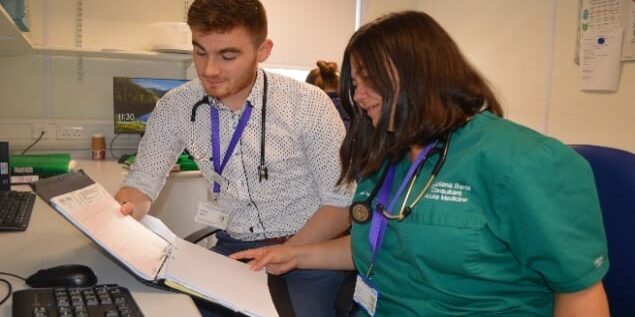Training Hub
Inside the Mind of an Acute Medic
Blog: Ramblings of an Acute Medicine Doctor - Transition from Registrar to Consultant
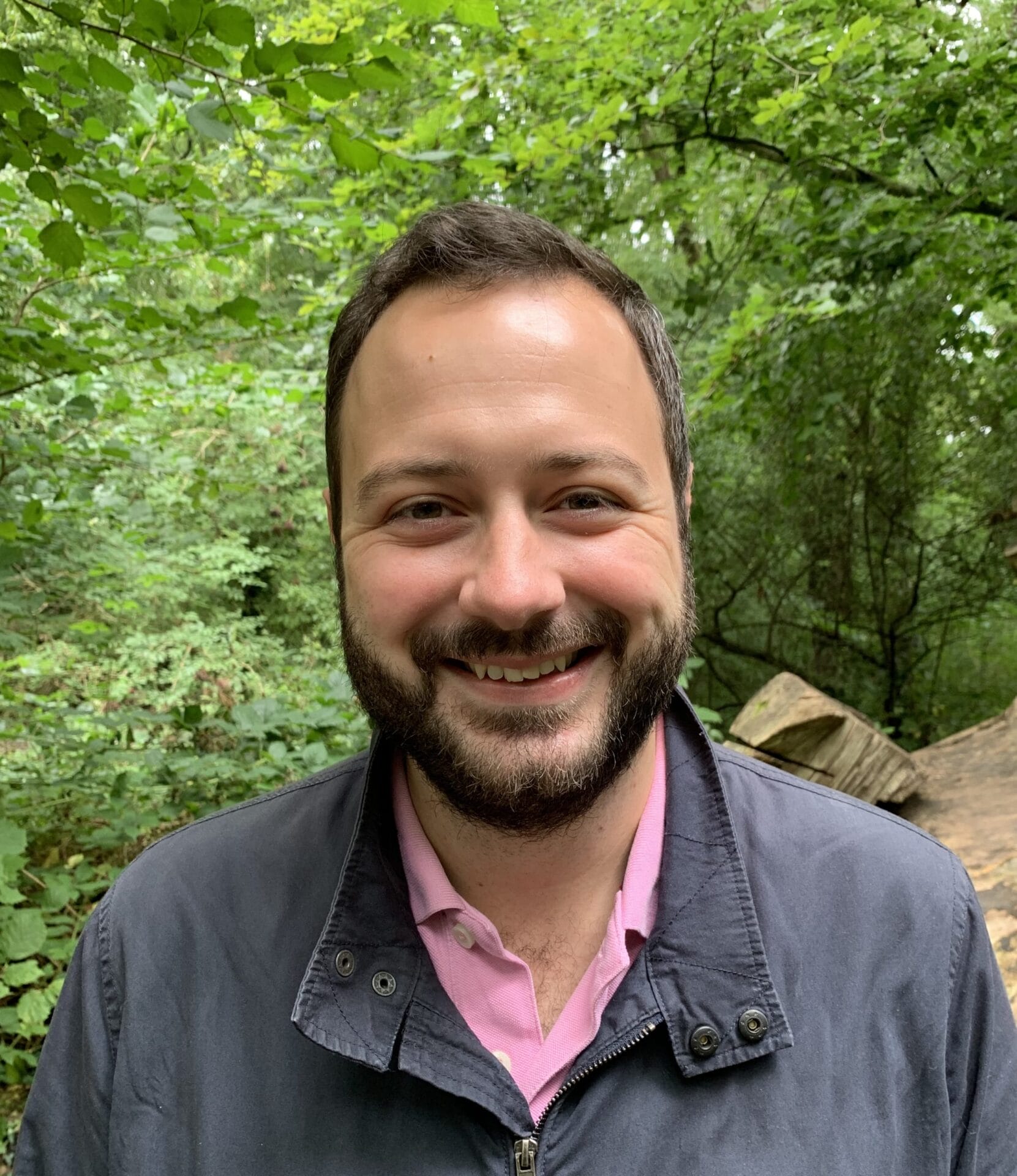
It took a bit of time to say ‘Hi, my name is Kelham the Acute Medicine Consultant” but we got there. I continually feel like I am waiting for somebody to jump out and laugh at me for falling for a ridiculous joke. I guess that’s Imposter Syndrome for you?
I am constantly apologising for asking others to do tasks. Tasks I would ask of others when working as a Registrar, but now feel like I am imposing. The first Lumbar Puncture I deemed necessary is a perfect example. For the first time in my career I advised a patient they needed a Lumbar Puncture but was not going to be the person performing or supervising the procedure. I looked at the team and asked who was comfortable doing the procedure. The team’s immediate response was nobody, but someone starting at 2pm would be. At the 2pm handover I then sheepishly asked if they could please very kindly do the LP. Of course the response was a very enthusiastic ‘yes!’ but I still felt like they hated me just a bit inside (I am sure this is not actually the case but my own crippling insecurities). I need to work on owning my new role within the team and appreciate that perhaps my skills are now better served elsewhere. More evidence of that Imposter Syndrome…
My first day was very reasonable. A steady ward round with an excellent team, effective management of patients through SDEC and good acuity on the take. The second day less so. I arrived at midday and there were a lot of outstanding tasks, including several procedures. The ward round had been challenging and more bodies were needed. I went off to go and observe a trainee perform a procedure in ED in order to tick their ePortfolio competency. Whilst we were discussing the procedure outside of the room the nurse caring for the patient popped their head out and said “The patient’s systolic blood pressure is 60 and they’re looking a bit clammy.” Cue panic. I have deliberately kept details vague to ensure patient confidentiality but this was a procedure I was familiar and comfortable with, but do not perform on a regular basis to any extent. The trainee was not overly comfortable with the procedure and in a less urgent scenario would have been more than capable with my supervision. However the situation had become somewhat more urgent and I took over. I’ve always struggled with somewhat of a hand wobble when doing procedures (surgery was never going to be the career for me) but this was a new level. Needless to say, I needed to change my scrubs afterward. It all went smoothly, the patient was far less sweaty by the time I had finished and I got an overwhelming sense of achievement. Upon reflection, this interaction was my bread and butter. Something you get very used to as a Registrar, dealing with acute issues and attempting to rectify them. I knew what needed to be done and achieved that. It felt good to have that win.
Dealing with uncertainty is something I struggle with. I have full insight into this and will be focussing on that over the next few months (any hints or tips are very welcome!) Uncertainty is ever present in our work within Acute Medicine. You can never definitively prove that the chest pain is musculoskeletal in origin. You rely on the patient’s history, examination findings, investigation results and your clinical experience to aid you in that conclusion. But you can never truly prove it. I have of course simplified a very complex decision making process, but it is an attempt to explain why I struggle with uncertainty. I am confident and comfortable when a positive diagnosis is evident (i.e. a PE found on a CTPA for a patient presenting with pleuritic chest pain). When there is doubt, I struggle. There is no guideline for uncertainty, there is no score you can calculate or pathway to follow. Uncertainty requires clinical experience and being put in that position time and time again. I have an excellent group of colleagues to discuss cases with and have no issue approaching any of them. Their experience is invaluable for me. Just before I started ‘acting up’ a Consultant told me “Never stop asking questions, in fact, you probably need to be asking more questions when acting up than you do as a Registrar”. This was exactly what I needed to hear.
Lastly, I have been trying to find my own way of working. I have been fortunate to work with many very good Acute Physicians and observe their very different approaches to managing the various facets to Acute Medicine and the art of the post take ward round. I don’t think I have quite found my comfort zone yet but have been trying out different styles. Be proactive and review patients without their full investigation results being available? Stand back and wait for all the results before I see them? Clerk patients directly myself? There are positives and negatives to all of these approaches and I don’t think I have a strong pull toward any of them. Personally, I think all approaches probably have their place at the right time. I try to avoid duplication and expect a medical SHO to ‘clerk’ the patient when an ED SHO has already seen them for example. Equally, my assessment is probably less useful the moment a patient walks on to AMU from the community than if a triage assessment is made first and initial investigations initiated prior to me seeing the patient. There has been so much to get my head around in the first week. I think I am coping, only time will tell if that continues.
This blog will document my experiences, thoughts and reflections of the transition from Registrar to Consultant. The aim being to help other Registrars with this transition and acknowledge the challenges we all face but perhaps don’t talk about.
@KelhamSlinger- Twitter
Date uploaded: 28/10/2021
This was the starting sentence of an email I received on my Son’s 3rd Birthday. Whilst not completely unexpected, it was about 6 months earlier than I had anticipated. It was this email that I feel the transition from Registrar to Consultant started for me, and it was overwhelming. I knew the ‘Grown Up Interview’ was inevitable at some stage but it had always felt like a theoretical concept, something we talk about but never actually happens. It was the most nerve wracking 6 weeks of my life. Those 6 weeks flew by.
It was sheer elation when I heard the words “we’d like to offer you the job”. I was on holiday in the Malvern Hills (covid was not going to ruin this trip), had just conducted the interview over a 4G connection as the WiFi was unacceptably awful and my family had just returned from their coffee trip, trying to keep tyrannical children out of the house during the interview. Relief and excitement, with everybody present to celebrate it too. It was perfect.
Fast forward three months and here I am, typing this reflection seven days before I am due to start my ‘acting up’ period. I am not a huge supporter of the term ‘acting up’. It sounds like somebody referring to a teenager going through their rebellious phase. I am very lucky to be finishing my ST7 at the same Trust that I have been appointed a Consultant. I have had fantastic support from all of my colleagues over the last three months. I have been supported in developing my own way of working. Identifying my own deficiencies and developing my strengths. It has been really rewarding to hear people say “Kelham is in clinic today, it’s like having another Consultant so everything will be fine”. However in seven days this will change. In seven days I am no longer “another” Consultant, I will be THE Consultant. That is terrifying.
There aren’t many (if any at all) written resources out there for this time in our careers. Sure, we have the advice and guidance of our peers, colleagues and bosses. But we’re Doctors. We want hard evidence, facts and something concrete to lean on. That is where the idea for this blog/diary/reflection (whatever you want to call it) came from. I don’t profess that this will be of the highest quality English and my grammar is definitely sub-par, it certainly won’t have academic rigour. However I hope it does provide somebody somewhere reassurance that all of the thoughts that run through your head at random points in the day are normal. That it’s okay to be scared and it’s okay to not be okay. If nothing else I think this will be more of an outlet for me, and that’s something.
I hope to talk about all of the things we’re too scared to talk about. Too scared to share with each other for fear of judgment or ridicule. With that in mind, I am very open to constructive criticism but please make it constructive. I don’t want a pile on akin to that seen on #MedTwitter. If you are reading this (and if anybody more than my Wife is reading then I will consider it a success), and if something has struck a chord with you then please get in contact. I would truly love to hear from you.
My name is Kelham Slinger and I am currently an ST7 Acute Medicine Registrar in Wessex. I am also one of the SAM Trainee Representatives. In August I was delighted to accept the role of Consultant in Acute Medicine at University Hospitals Dorset NHS Foundation Trust, you guessed it...in Dorset. This Trust currently has two acute sites- Royal Bournemouth Hospital and Poole Hospital. I am currently working as a Registrar in Bournemouth but my ‘acting up’ period is taking place 8 miles down the coast in Poole which is also where, for now, my main place of work will be when I CCT. I have a truly magnificent Wife, currently on Maternity leave and is a Geriatric Medicine Registrar, and two children aged 3 and 5 months. I live on the outskirts of the New Forest and enjoy exploring it whilst running (an insane hobby I have only discovered in the last 6 months).
This blog will document my experiences, thoughts and reflections of the transition from Registrar to Consultant. The aim being to help other Registrars with this transition and acknowledge the challenges we all face but perhaps don’t talk about.
@KelhamSlinger- Twitter
Date uploaded: 28/10/2021
It has been four weeks since I have updated this blog (n.b. everyone being busy means this is even later and I wrote this several weeks ago, another blog to follow soon…) and a fair amount has happened in this time. I have completed my first weekend as the solo Acute Physician in the Hospital (support provided by GIM Consultant), I have said yes to my first project and I have had my first discussion with the Medical Examiner.
The weekend shifts have a bad reputation. The ward round takes most of the day, constant interruptions (albeit valid and necessary most of the time), pressure for discharges and new admissions piling up. I had my first weekend four weeks into my ‘acting up’ period, done intentionally to allow me some time to bed in first. I can now say with confidence that all of the above was entirely accurate. Throughout the weekend I was consciously thinking about a talk Dr Vicky Price gave at a SAM conference last year. If you didn’t catch it you should try and find a recording, it was an excellent presentation! Essentially Vicky brilliantly describes the persistent interruptions we experience, and how this impacts on our ability to focus and provide best care for our patients. I wanted to find that right balance between providing support and advice to those that needed it, but also ensure I maintained focus on the task at hand. I tend to ask those that approach me for advice to wait while I finish what I am doing, unless it is truly imminently urgent (which it rarely is). I’ve not had any eye rolls, huffs or frustration at this technique yet and it seems to be working well so I plan to continue!
This will sound obvious but valuing the contributions of the team is so important. We are very lucky to have a wonderful cohort of Advanced Nurse Practitioners (ANPs) who are incredibly experienced, and provide an outstanding service within our Department. They are certainly a major part of why I chose to work for the Trust having worked with them as a Registrar. Non-Medical Prescribers (NMPs), whether ANPs, Physician Associates (PAs) or otherwise, are becoming an increasingly important part of the workforce. We need to be looking outside traditional staffing models, where Doctors are the main medical presence and welcome the diverse contribution that NMPs provide. During my weekend the ANP kept me sane. They prevented me from feeling overwhelmed, regularly reminded me to take breaks and ultimately debriefed me after a pretty rough encounter…
I had seen an older lady on Saturday who had presented with symptoms that were very concerning. She had not wanted to bother the NHS with her problems for many months as she knew the pressure we were all under. How many times have we heard that line now? It’s devastatingly sad. Unfortunately late on Saturday, after I had gone home, a CT scan had confirmed my concerns. I arrived on Sunday intending to talk her through this scan and what the next steps were. Sadly during handover the emergency alarm was pulled and she had become unresponsive. Before any further investigation could be arranged to identify what may have happened she sadly died. This was a lady who the day before was alert, making jokes in spite of me telling her my concerns, had sat on her symptoms for months because she was thinking of others above herself, and had now died suddenly. I debriefed the nursing and medical team present. Justified how it was unlikely we could have done anything more and comforted the SHO who felt responsible for what had happened. What I had hidden from them was that I was shaken up. I questioned whether I should have done a CT of her brain the day before. What could I have done to prevent this morning from happening? Was this my fault? Looking back I regret hiding this from the team. I was trying to be the strong leader people typically look for in these situations, but I now think this was wrong. People want to see an honest leader. A leader who is able to verbalise how they are feeling and own those feelings. A leader who can demonstrate that it’s okay to feel sad, frustrated, disappointed. I wasn’t comfortable with my own emotions which is why I hid them from the team. I also don’t think I had truly processed what had happened myself. It was only after the ANP let me talk at them for 20 minutes that I was able to rationalise my thoughts. They understood me. They had been there before. They had had other new Consultants talk at them about their terrible experiences. They didn’t say anything, just acknowledged what I was saying and let me come to my own conclusion. It was exactly what I needed. Thank you Nicky. You will never know how grateful I am for you listening.
After a period of reflection the one thing I regret about this situation was that I was not able to tell her the result of the scan or meet with her daughter before Sunday’s events. Ultimately I had to call her daughter, who had not spoken with anybody beforehand, and inform her that her Mum had died. I find these phone calls the hardest to make. The daughter was understandably upset and I arranged to meet her on the ward. I went through everything and explained what had happened. Her main concern was ensuring her Mum was not in pain or alone at the time she died. I was able to reassure her that her Mum was cared for at the immediate end of her life and she had many brilliant members of staff with her. I think her daughter left with a better understanding of what had happened and could appreciate that there was little we could have done to change the outcome. We all acknowledged her Mother’s stoical stance toward her symptoms and not wanting to bother the NHS and that this was a sad representation of the healthcare service at the moment.
I then had my first discussion with the Medical Examiner (ME). I had briefly run through the case with a colleague. I had an excellent conversation with the ME who was satisfied with putting a cause of death without a post-mortem. I then received an email later that day. The ME had spoken to the Daughter about the cause of death. The daughter asked the ME to pass on her thanks for the care her Mum received and that the time I was able to give her on the Sunday provided her with closure. A stressful event had suddenly developed a positive reflection. Giving that person 30 minutes of my time allowed them to come to terms with their Mother’s death and begin the grieving process. At the end of my first weekend I was able to look back and believe I did an alright job.
I purposefully booked a week of annual leave at the end of my first month. It is vitally important we look after ourselves, particularly when going through a significant change in our working lives. My first recommendation for acting up- take a week of annual leave after the first month. I can’t stress that enough! I’ve done a lot of Christmas shopping, had lunches out with my family, wandered round the lights at Longleat and booked a short break for February! I have come back to my second weekend (swap with a colleague) feeling energised and ready to tackle the next challenges that come my way. I’ve got plenty to look forward to, I love my job and getting up in the morning is never an issue as a result (unless it’s 4am and my 6 month old daughter is ready for play time!)
@KelhamSlinger- Twitter
Date uploaded: 09/01/2022
Without sounding like a cliche, the last three months have flown by. It has been a steep learning curve. The clinical side of the job has been fine. There are challenging cases that completely flumox me, but we have an absolutely fantastic medical, nursing and AHP team who have helped me out on multiple occassions. It is the non-technical and non-clinical element that has been a significant step up.
The balance of risk in Acute Medicine is, in my opinion, fundamentally where we differ from other organ based medical specialties. Ambulatory Care is at the forefront of our service and provides an excellent resource, enabling us to manage risk in a controlled way. This balance is forever swinging and inevitably varies due to multiple factors, including recency bias. I met a gentleman in his 70s who presented with chest pain. He had some risk factors for coronary disease and his resting ECG was normal. He had two troponin measurements more than three hours apart which were mildly positive but not significantly incrementing. He was referred to Ambulatory Care by the Emergency Department as a low risk chest pain. Whilst taking the history something just did not feel right. I couldn’t put my finger on why. A lot of the objective measures were reassuring and should have led me to send him home with outpatient investigations. However his history was somewhat odd, I can’t really verbalise why. I had concluded that I was going to admit him (despite concern that I was being overly cautious and that my more learned Cardiology colleagues would send him home the next day) when he said “I am having one of my funny episodes now…”. The patient proceeded to collapse in the chair, became unresponsive and stopped breathing. A quick pulse check and he had suffered a cardiac arrest. What followed was absolutely excellent team work from all in Ambulatory Care and AMU. The patient was hooked up to the defibrillator, VT identified and a shock delivered within 60 seconds of his collapse. He reverted to sinus rhythm and over the next 20 minutes he steadily recovered without any neurological impairment. Once the patient had recovered and was being monitored on our Cardiac Unit, all I could think about was what if I had sent them home for outpatient investigations? What would have happened had their cardiac arrest happened 30 minutes later in the car park? These thoughts mess with your mind. I am now very cautious about accepting any troponin positive chest pain patients to our Ambulatory Care. That’s recency bias directly impacting on my decision making process. After a little while I am sure that it will creep back into my Ambulatory practice, but for now I am much happier with them on a monitor and in a bed where I can check my own spidey sense first.
A Consultant once said to me always trust your spidey-sense. If something doesn’t feel right, despite objective evidence to the contrary, then feel confident in your instinct and follow it. It was this piece of advice in the forefront of my mind during my consultation with the patient above. It might as well have been up in lights, flashing and doing a dance above the patient’s head. I am sure most of us have had this experience and it is impossible to rationalise our thought process to somebody else. All of the objective pieces of information we use to formulate our decisions are reassuring and make you seem over-cautious to colleagues, but something just isn’t right. It is time and experience that informs this spidey-sense. There isn’t an RCT or consensus statement that informs this decision making. You can’t quote p values or demonstrate statistical significance. You just know something isn’t right. Most of the time you probably are being over cautious but that’s probably worth it for the one case you’re not.
Efficiency in Acute and Urgent Care is a challenge. We are constantly striving to find that balance between optimising the patient journey to reduce wasted bed days, or even hours in the case of Acute Medicine, versus thorough and considered patient care. There are many areas to consider when addressing efficiency in this context, however one I am yet to develop an opinion on is ‘Consultant Clerking’. I am not talking about a Consultant reviewing a patient for ‘post-take’ purposes who has already seen a secondary care practitioner. I am talking about a Consultant seeing a patient who has either arrived on AMU directly from the Emergency Department triage or the Community. This may or may not be before test results are available. In my experience this approach is often adopted when hospital capacity is tight, Emergency Departments are beyond their limit and staffing is struggling to keep up. Early senior decision making is vital to optimising the patient’s journey. But can this be too early?
I saw an elderly, but not frail, patient who had been referred on a weekend from the community with several months of breathlessness. The primary care practitioner knew the Hospital was under pressure so sent some bloods for us and had already performed an ECG. Given the systemic pressures across our healthcare service at the time I did what I thought was sensible and reviewed the patient directly before a more junior member of the medical team. The nursing staff had highlighted their NEWS of 0 and their impression that the patient seemed well enough to be at home. All their investigations that I reviewed were normal. I discharged them after my review with some medications and follow-up scheduled in a clinic the following week. About a month later I had the dreaded “do you remember patient so-and-so that you saw a few weekends ago?” Gulp. I didn’t recall them straight off but a quick glance at the electronic record and I remembered them. The clinic had received the referral, noticed a particularly abnormal blood test, referred the patient back to our Ambulatory Care who then identified a very significant pathology. The patient was okay, treated appropriately and fortunately no harm arose. The test had been sent by the primary care practitioner, I was unaware of it being sent and did not request it. Reflecting on this incident I am unsure whether the result was visible on the electronic record at the time I saw the patient and I missed it or whether the rest of their results were visible but that single result wasn’t. I know from my own practice that had I seen the result then I would have investigated further. There are multiple issues in this incident, which I have simplified for confidentiality purposes. What I am trying to highlight is whether early senior decision making can be too early? In our constant strive for efficiency and optimising care for all that need it at the front door, not just the single patient in front of us, are we going too far? Am I going too far? The repeated patient interactions with various members of the secondary care team- ED Practitioner, ED Consultant, Medical Practitioner, Medical Consultant on the face of it appear to be wasteful. However, does this process not provide multiple opportunities to intercept potential errors? Do we need more robust IT solutions to prevent errors which also reduce the need for multiple patient interactions? My conclusion is probably that all of the above and more are needed. Regardless, this demonstrates another non-technical skill I need to continue developing and I question whether there is a single right answer.
These thoughts rarely creep into my head independently. Occasionally it’s while I’m commuting or on a run but it usually comes from my daily debrief. My brilliant Wife is also Medical, we met in the first year of Medical School. She is a Geriatric Medicine SpR and the only reason she is also not going through the same experience as I am is that she has selflessly dedicated two of the last 4 years to raising our children. She is an incredibly driven woman who is passionate about her work and knows where she wants to go with her career. She is also a wonderful Mother and she manages to straddle both these parts of herself with awe-inspiring ease. We regularly joke, but I am deadly serious, there is absolutely no way I would survive looking after both of our children alone for more than a couple of days. Yet she has done this repeatedly with my late finishes and weekend commitments at work. I won’t apologise for this second cliche but she really is superwoman. Some feel very strongly about keeping work away from home. Some feel that ‘talking shop’ means that work intrudes into personal lives and that ability to decompress is lost. I think I can say for both my Wife and I that we feel very much the opposite. There is of course a balance to be struck but without her, I have no idea where my mind would be with some of the stuff I deal with on a daily basis. She doesn’t need to fix anything or come up with solutions. She knows she just needs to listen, lend a sympathetic ear and tell me everything is going to be okay. Regularly we do come up with methods of dealing with an issue and on multiple occasions I have changed something I do based on her own experiences. I think we have a healthy relationship with our work chat. Without it I am not sure either of us would have coped with our medical training.
To my Wife, thank you for dedicating a significant part of your life to raising our children how we want them to be raised. Thank you for encouraging me, supporting me and lifting me (even if you are 5”3’) through the difficult times. Thank you for sacrificing part of your career and your life. I did it. Now it’s your turn. Go get ‘em.
My ‘acting up’ is over and I am typing this on the first day of my very extravagant two week career break. A colleague has taken to calling it ‘gardening leave’ which of course strikes much debate and gossip as to what my background might be that necessitates gardening leave. I think it develops an air of mystique and I am quite enjoying it! If only to watch the sheer look of disappointment when I tell people that I am simply taking two weeks away, spending it with my Wife and two children, and experiencing the joys of Center Parcs for the first time as a parent!
Watch this space for the first instalment of being a real Consultant…
@KelhamSlinger- Twitter
Date uploaded: 02/02/2022


